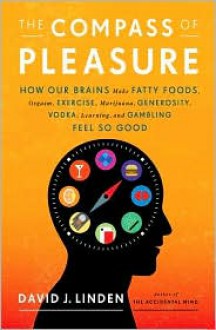The Compass of Pleasure: How Our Brains Make Fatty Foods, Orgasm, Exercise, Marijuana, Generosity, Vodka, Learning, and Gambling Feel So Good
From the New York Times bestselling author comes a "hugely entertaining" (NPR.org) look at vice and virtue through cutting-edge scienceAs he did in his award-winning book The Accidental Mind, David J. Linden—highly regarded neuroscientist, professor, and writer—weaves empirical science with...
show more
From the New York Times bestselling author comes a "hugely entertaining" (NPR.org) look at vice and virtue through cutting-edge scienceAs he did in his award-winning book The Accidental Mind, David J. Linden—highly regarded neuroscientist, professor, and writer—weaves empirical science with entertaining anecdotes to explain how the gamut of behaviors that give us a buzz actually operates. The Compass of Pleasure makes clear why drugs like nicotine and heroin are addictive while LSD is not, how fast food restaurants ensure that diners will eat more, why some people cannot resist the appeal of a new sexual encounter, and much more. Provocative and illuminating, this is a radically new and thorough look at the desires that define us.
show less
Format: hardcover
ISBN:
9780670022588 (0670022586)
Publish date: April 14th 2011
Publisher: Viking Adult
Pages no: 240
Edition language: English
Category:
Non Fiction,
Food And Drink,
Food,
Science,
Biology,
Health,
Sociology,
Psychology,
Medicine,
Neuroscience,
Brain

This book was mostly about addiction, and talked a lot about drugs. I was hoping more time would be spent discussing how pleasure functions in a healthy, positive way, and then also learning about the flip side. It certainly had a few interesting insights about addiction, but the interesting bits ...

A nice pop-but-somewhat-technical book on dopamine. I found it easy to follow, but it is neurochemically focused and probably requires some familiarity with brain function.

I should have been a neuroscientist. I love this stuff so much! Linden does a great job here of explaining without either oversimplifying or obfuscating. I learned a lot about the pleasure circuitry of the brain. Perhaps my favorite bit was near the end, where Linden takes on Kurzweil's singularity ...






 11 years ago
11 years ago




 13 years ago
13 years ago